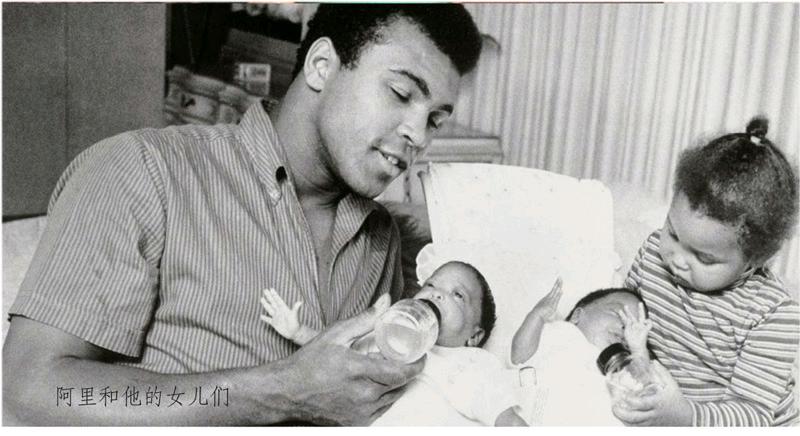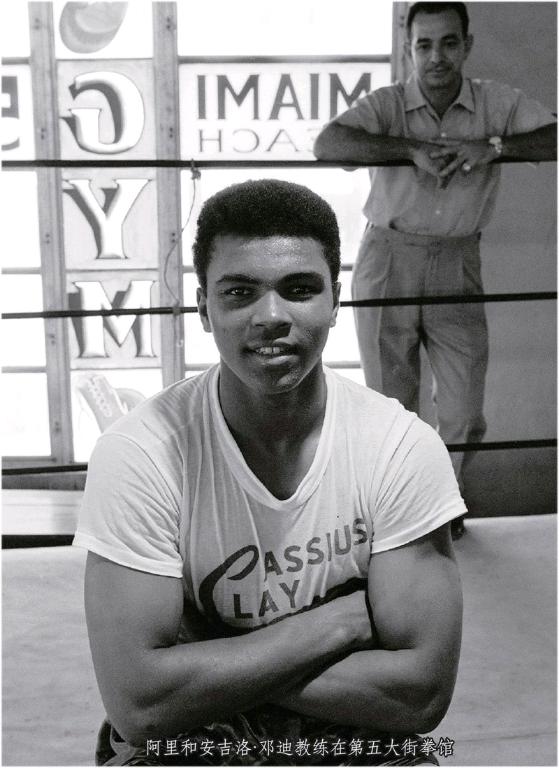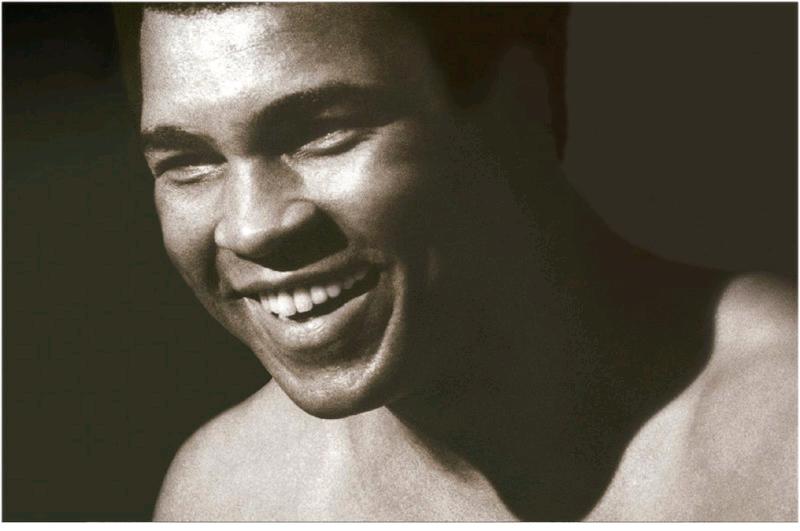穆罕默德?阿里:最伟大的拳击手
2016-09-05李忱
李忱
Muhammad Ali, the charismatic three-time heavyweight boxing champion of the world, who declared himself “the greatest” and proved it with his fists, the force of his personality and his magnetic charisma, and who transcended the world of sports to become a symbol of the antiwar movement of the 1960s and a global ambassador for cross-cultural understanding, died June 3 at a hospital in Scottsdale, Ariz., where he was living. He was 74.
Mr. Ali dominated boxing in the 1960s and 1970s and held the heavyweight title three times. His fights were among the most memorable and spectacular in history, but he quickly became as well known for his colorful personality and his showy antics1) in the ring.
He claimed the heavyweight championship in 1964, with a surprising upset2) of the formidable3) Sonny Liston4). Mr. Ali came to represent a new kind of athlete, someone who created his own style in defiance of the traditions of the past. Glib5), handsome and unpredictable, he was perfectly suited to television, and he became a fixture6) on talk shows as well as sports programs.
One of his assistants, Drew “Bundini” Brown, captured7) his lithe8), graceful presence in the ring, saying Mr. Ali would “float like a butterfly, sting like a bee.” The description entered the vernacular9).
Mr. Ali appealed to people of every race, religion and background, but during the turbulent, divisive 1960s, he was particularly seen as a champion of African Americans and young people.
In 1967, after Mr. Ali had been heavyweight champion for three years, he refused to be inducted10) into the military during the Vietnam War. Despite the seeming contradiction of a boxer advocating nonviolence, he gave up his title in deference to11) the principle of pacifism.
“Why should they ask me to put on a uniform and go 10,000 miles from home and drop bombs and bullets on brown people in Vietnam,” Mr. Ali said in 1967, “while so-called Negro people in Louisville12) are treated like dogs and denied simple human rights?”
The Rev. Martin Luther King Jr. supported his decision to become a conscientious objector13) as “a very great act of courage.”
Mr. Alis heavyweight title was immediately removed, and he was banned from boxing for more than three years. He was sentenced to five years in prison, but his conviction was unanimously overturned by the U.S. Supreme Court in 1971.
Mr. Alis decision outraged the old guard14), including many sportswriters and middle Americans, who considered the boxer arrogant and unpatriotic. But as the cultures of youth and black America were surging to the fore15) in the late 1960s, Mr. Ali was gradually transformed, through his sheer magnetism and sense of moral purpose, into one of the most revered figures of his time.
A casual statement he made in 1966—“I aint got no quarrel with them Viet Cong16)”—distilled the antiwar views of a generation.
“Ali, along with Robert Kennedy17) and the Beatles in the persona of John Lennon, captured the 60s to perfection,” writer Jack Newfield told Thomas Hauser, the author of a 1991 oral biography, Muhammad Ali: His Life and Times. “In a rapidly changing world,” Newfield added, “he underwent profound personal change and influenced rather than simply reflected his times.”
Later, as Mr. Alis boxing career receded into the past, and as neurological infirmities left him increasingly slowed and silenced, he became a symbol of unity and brotherhood, someone whose very presence and image acquired an aura of the spiritual. He was greeted by thousands whenever he toured the world. He “evolved from a feared warrior,” Hauser wrote, “to a benevolent monarch and ultimately to a benign venerated figure.”
In 1996, Mr. Ali stood at the top of a podium during the opening ceremonies of the Summer Games in Atlanta in what became one of the most indelible18) moments in Olympic history. Shakily holding the torch as an estimated three billion people watched on television, Mr. Ali lit the Olympic flame, marking the official beginning of the Games. He stood alone before the world, a fragile, yet still indomitable19) demigod.
Ali was born Cassius Marcellus Clay Jr. on Jan. 17, 1942, in Louisville. His father was a sign-painter, and his mother was a domestic houseworker. Mr. Ali played few sports as a child, but he began boxing at age 12 to exact revenge on a thief who had stolen his bicycle. He quickly became enamored20) of the sport, and he won several national amateur boxing championships before he graduated from high school in 1960.
That year, he went to the Summer Olympics in Rome and came back with the gold medal in the light-heavyweight division, defeating a three-time European champion from Poland. He was only 18.
Mr. Ali then became a professional fighter, signing a contract with 12 wealthy supporters who called themselves the Louisville sponsoring group, or syndicate21). After working briefly with light-heavyweight champion Archie Moore22), Mr. Ali joined forces with trainer Angelo Dundee23), whom he had met several years earlier. Dundee took Mr. Ali to Miami Beach, Fla., to train at the fabled Fifth Street Gym on a then-run-down street corner.
In the ring, Mr. Ali had an unconventional, almost casual style, lightly bouncing on his feet while keeping his hands low at his sides. Some sportswriters considered it an almost suicidal approach, but Dundee trusted in Mr. Alis foot speed and quick reflexes, which enabled him to evade punches.
Because of his unusual stance and constant movement, Mr. Alis punches arrived from unexpected angles, carrying devastating power. As other fighters hunkered24) in the center of the ring, with their fists doubled in front of their faces, Mr. Ali danced around them, seemingly at play.
Before retiring in 1981 with a record of 56-5, he was already showing signs of slurred speech and general sluggishness, which only grew worse with time. His condition25) was initially called Parkinsons syndrome, which many thought—correctly or not—was caused or exacerbated26) by the thousands of punches he absorbed throughout his career.
Judged purely for his boxing skills, Mr. Ali ranks among the greatest heavyweights ever, alongside Joe Louis, Jack Johnson, Jack Dempsey and Rocky Marciano27). But he possessed a quality that reached beyond his accomplishments in the ring to make him recognized by millions the world over.
Even in his diminished physical state, Mr. Ali was admired not just as a supreme athlete but as a hero, as a symbol of understanding and hope. Presidents sometimes called on him to make diplomatic visits abroad, and in 1990 he helped return several U.S. hostages held in Iraq. President Obama said in a statement that he keeps a photograph of Mr. Ali and a pair of his boxing gloves in his private study at the White House.
A 1996 documentary about Mr. Alis 1974 battle with George Foreman28), When We Were Kings, won an Academy Award for best documentary. A Hollywood feature film about his life, starring Will Smith, was released in 2001. His name was added to the International Boxing Hall of Fame in 1990.
Mr. Ali issued a plea for peace after the terrorist attacks of Sept. 11, 2001. He continued to travel and make public appearances, often for charity, until shortly before his death. Even in the presence of presidents, popes and other world leaders, Mr. Ali was always the most famous person in the room. He was awarded the Presidential Medal of Freedom, the nations highest civilian honor, by President George W. Bush in 2005.
Mr. Ali often visited prisons and hospitals and, throughout his life, used simple sleight-of-hand29) tricks to connect with children and adults all over the globe, until his deteriorating physical condition led him to curtail his public appearances.
From a boxing ring in Manila to villages in Zaire to the Olympic Games in Atlanta, he had a radiant presence that seemed more in keeping with that of an international religious leader than a retired athlete. More than almost any other figure of his age, Mr. Ali was recognized and honored as a citizen of the world.
“Look at all those lights on all those houses,” Mr. Ali told Esquire30) magazine writer Bob Greene in 1983, while flying into Washingtons National Airport. “Do you know I could walk up to any one of these houses, and knock on the door, and they would know me?
“Its a funny feeling to look down on the world and know that every person knows me.”
极富魅力的三次世界重量级拳击冠军得主穆罕默德·阿里于6月3日在其居住的亚利桑那州斯科茨代尔市的一家医院去世,享年74岁。他曾自称是“最伟大的拳击手”,并用拳头、人格力量和迷人的魅力证明了这一点。他超越了体育界,成为20世纪60年代反战运动的象征,成为跨文化理解的全球大使。
20世纪六七十年代,阿里称霸拳坛,并三次获得重量级拳击冠军。他的比赛是史上最让人印象深刻、最令人叹为观止的比赛。不过,他很快也因为多彩的人格和拳击场上吸引眼球的搞怪动作而为人们所熟知。
1964年,他出人意料地击败了令人闻风丧胆的索尼·利斯顿,成为重量级拳击冠军。阿里开始成为新一类运动员的代表,他敢于挑战过去的传统,创立了自己的风格。他善于言辞、仪表堂堂、不按常理出牌,完美契合上电视节目的需要,因此他既是体育节目的常客,也经常亮相于脱口秀节目。
阿里的助理之一、外号“邦迪尼”的德鲁·布朗捕捉到了阿里在场上轻盈、优雅的姿态,说他“轻盈如蝶舞,出拳如蜂蜇”。这句话已进入了日常用语。
无论对于哪个种族、哪个宗教、哪个背景的人来说,阿里都有着强烈的吸引力。不过在动荡分裂的20世纪60年代,他尤其被视为非裔美国人以及年轻人的英雄。
1967年,阿里拒绝在越南战争期间应召入伍,那时他成为重量级拳击冠军已有三年。尽管拳击手提倡非暴力看起来有些矛盾,但为了遵从反战主义的原则,他放弃了冠军称号。
“他们凭什么要我穿上军装,到离家一万英里的地方,向越南棕色皮肤的人们投掷炸弹、射出子弹?”阿里在那年说道,“而与此同时,路易斯维尔那些所谓的黑人还被当做狗一样对待,连基本的人权都没有。”
对于阿里拒服兵役的决定,马丁·路德·金牧师表示支持,并称之为“有勇气的壮举”。
阿里立即被取消了重量级冠军的称号,并在三年多的时间内被禁止参加拳击比赛。他还被判了五年监禁,但1971年,美国最高法院一致表决推翻了对阿里的定罪。
阿里的决定激怒了保守派,其中包括许多体育新闻记者和美国的中产阶级,他们认为这位拳击手骄傲自大、缺乏爱国心。但20世纪60年代末期,随着青年文化和美国黑人文化的蓬勃兴起,阿里凭借自己纯粹的魅力和道德目的感,逐渐转变为他那个时代最受人敬重的人物之一。
他曾在1966年的一次非正式声明中说:“我和那些越共的人之间又没有仇。”这句话概括出了一代人的反战心声。
托马斯·豪泽是1991年阿里口述传记《穆罕默德·阿里的一生》的作者。作家杰克·纽菲尔德曾对他说:“阿里、罗伯特·肯尼迪以及披头士乐队的约翰·列侬完美刻画出了20世纪60年代人们的特点。”纽菲尔德补充道:“在急速动荡的年代,阿里个人经受了巨大的改变,他不仅反映了他的时代,更影响了他的时代。”
后来,阿里结束了他的拳击生涯,又因神经方面的病症渐渐变得行动迟缓、沉默寡言,他成了团结一致和手足情谊的象征。只要他一出现,他的出场和形象就有了一种精神光环。每当他去世界各地访问,他都会受到数千人的欢迎。豪泽在书中写道,他“从一名令人畏惧的勇士逐渐变成一位与人为善的君主,并最终成为一个善良可敬的人物”。
1996年亚特兰大夏季奥运会的开幕式上,阿里站上了点火台,这一幕成了奥林匹克历史上最难忘的瞬间之一。在观看直播的约30亿观众的注视下,阿里颤抖着举起火炬,点燃了奥运圣火,宣告奥运会正式开幕。他独自站在全世界面前,虽然虚弱,却仍是不可战胜的英雄。
1942年1月17日,原名为小卡修斯·马塞勒斯·克莱的阿里出生于路易斯维尔,父亲是广告牌画工,母亲是家政服务人员。阿里小时候很少做运动,但在12岁时,为了报复盗窃他自行车的小偷,他开始学习拳击,并很快就迷上了这项运动。到1960年高中毕业时,他已经数次赢得全国业余拳击赛冠军。
那年,阿里参加了罗马夏季奥运会,并打败了一位曾三次获得欧洲赛冠军的波兰选手,夺得轻重量级组金牌。那时的他只有18岁。
之后,阿里成为一名职业拳击手,并与12位富有的支持者签订了合约。这些人自称路易斯维尔赞助组或辛迪加。在与轻重量级冠军阿奇·穆尔短暂合作后,阿里加入到几年前曾谋面的安吉洛·邓迪教练的队伍中。邓迪把阿里带到了佛罗里达州的迈阿密滩市,在传奇的第五大街拳馆训练。拳馆就位于街角,那条街道当时还十分破败。
拳击场上,阿里的非传统风格几乎称得上随意,他双手低垂在身体两侧,同时轻盈地跳跃。一些体育新闻记者认为这种打法近乎自杀,但邓迪相信,阿里的脚步速度和快速的反应能力足以让他躲过拳头。
阿里的姿势不同寻常,步伐不断移动,因此出拳的角度出其不意,力量惊人。别的拳击手蹲在场中央,双拳护于面前,此时的阿里却围着他们跳来跳去,像在做游戏。
1981年退役前,阿里创造的最高纪录是56胜5负。那时他已表现出口齿不清、整体上呆滞的迹象,而且这些症状日益严重。他的病最初被称作帕金森综合征,虽然不知这种说法是否正确,但很多人认为这是他职业生涯中挨的数千次拳头造成的,也有人说这些拳头加重了他的病情。
单纯就拳击技巧而言,阿里在史上最伟大的重量级拳王中占有一席之地,此外还有乔·路易斯、杰克·约翰逊、杰克·登普西以及洛基·马西亚诺。但阿里拥有超出其赛场成就的品质,并因此为全世界范围内的数百万人所熟知。
即使身体状况每况愈下,阿里依然受人敬仰,在人们心中,他不只是最杰出的运动员,更是英雄,是理解和希望的象征。总统们有时也会给他打电话,要他到国外进行外交访问。1990年,他协助解救了几名困于伊拉克的美国人质。奥巴马总统曾在一次声明中提到,他在白宫的私人书房里保留了一张阿里先生的照片以及他的一副拳击手套。
1996年纪录片《一代拳王》讲述的是1974年阿里与乔治·福尔曼之间的较量,该片获得了奥斯卡最佳纪录片奖。还有一部描述阿里生平的好莱坞故事片于2001年发行,该片由威尔·史密斯主演。1990年,阿里入选国际拳击名人堂。
2001年“9·11”恐怖袭击后,阿里发起和平倡议。直到去世前不久,他都在四处奔波,公开露面,大都是为了慈善事业。甚至在总统、教皇和其他世界领导者面前,阿里都一直是在场最著名的人物。他曾于2005年被乔治·W·布什总统授予总统自由勋章,这是美国给予平民的最高荣誉。
阿里一生常去监狱和医院探访,用一些简单、敏捷的戏法与全球的大人、孩子进行交流,直至因日益恶化的身体状况而不得不减少公开露面的次数。
不管是马尼拉的拳击场,还是扎伊尔的村庄,或是亚特兰大奥运会,无论在哪里,阿里都光芒四射,更像是国际宗教领袖而不是退役运动员。与同时代的几乎任何人相比,阿里都更为人们认可,被尊为世界公民。
“看那些房子上的灯光,”阿里于1983年在飞往华盛顿国家机场的途中对《风尚》杂志的撰稿人鲍勃·格林说道,“你知道吗?我可以径直走向其中任何一栋房子,然后敲开门,里面的人都认识我。”
“俯瞰世界,知道每个人都认识我,这真是件有趣的事。”
1.antics [??nt?ks] n. [复] (旨在哗众取宠的)滑稽动作;奇怪的行为;古怪的姿势
2.upset [??pset] n. (比赛、竞争等中的)意外击败;意外结果
3.formidable [?f??(r)m?d?b(?)l] adj. 令人望而生畏的
4.Sonny Liston:索尼·利斯顿(1932~1970),世界知名重量级职业拳击手,外号“魔王”。
5.glib [ɡl?b] adj. 能说会道的
6.fixture [?f?kst??(r)] n. (某处的)常客
7.capture [?k?pt??(r)] vt. (用画面、音乐、文字等)捕捉住(气氛、特点等);成功地描述
8.lithe [la??] adj. 柔软的,易弯曲的
9.vernacular [v?(r)?n?kj?l?(r)] n. 本国语;日常用语
10.induct [?n?d?kt] vt.〈美〉征召……入伍
11.in deference to:遵从;有鉴于,考虑到
12.Louisville:路易斯维尔,美国肯塔基州中北部城市,位于俄亥俄河畔,是穆罕默德·阿里的出生地。
13.conscientious objector:(出于道德或宗教上的原因而)拒服兵役者
14.old guard:(某一事业的)保守派
15.to the fore:(突然)处于显著地位
16.Viet Cong:越共(越南战争时南越民族解放阵线及其游击队的非正式名称)
17.Robert Kennedy:罗伯特·肯尼迪(1925~1968),第35任美国总统约翰·肯尼迪的弟弟,曾任美国司法部长和纽约州参议员,是著名的反对越战的民主党人。
18.indelible [?n?del?b(?)l] adj. (记忆、印象等)不可磨灭的;难忘的
19.indomitable [?n?d?m?t?b(?)l] adj. 坚韧不拔的;不气馁的
20.enamored [??n?m?(r)d] adj. 迷恋的
21.syndicate [?s?nd?k?t] n. [经]辛迪加;企业联合组织
22.Archie Moore:阿奇·穆尔(1916~1998),美国著名轻重量级职业拳击手
23.Angelo Dundee:安吉洛·邓迪(1921~2012),美国拳坛的传奇教练,共培养出15位世界冠军拳击手。
24.hunker [?h??k?(r)] vi. 蹲
25.condition [k?n?d??(?)n] n. 疾病
26.exacerbate [?ɡ?z?s?(r)be?t] vt. 使恶化;使加剧
27.四人皆为美国著名职业拳击手,都曾获得世界重量级拳王称号。
28.George Foreman:乔治·福尔曼(1949~),美国著名职业拳击手,曾获世界重量级拳击冠军。
29.sleight-of-hand:敏捷而熟练的手法
30.Esquire:《风尚》月刊,美国一本供男性阅读、文风精致、格调高雅的大开本杂志,创办于1933年。
